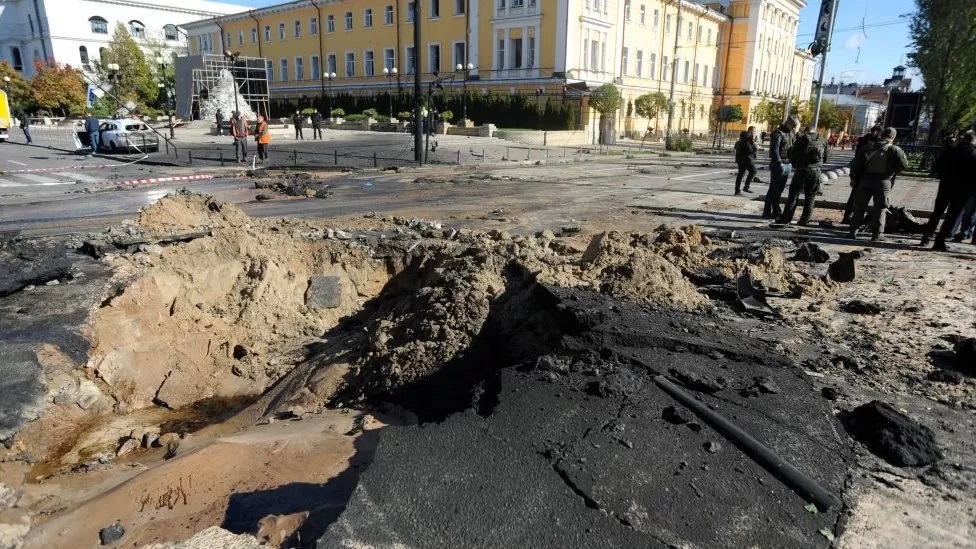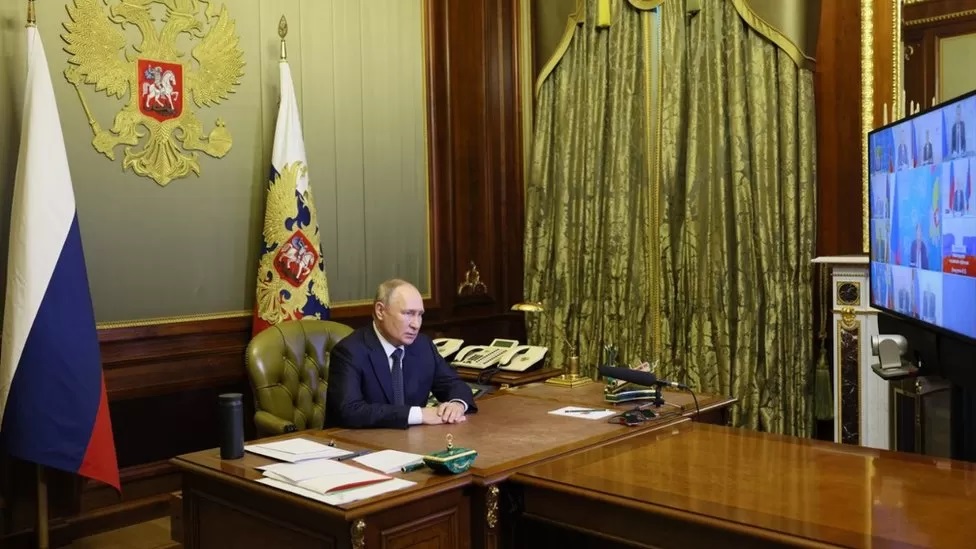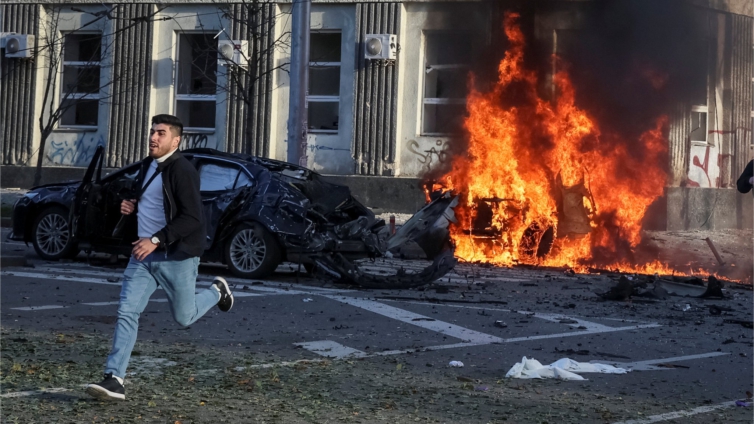Russia has been widely condemned after bombarding cities across Ukraine, including launching missile strikes on the centre of Kyiv for the first time.
The US said the "brutal" attacks had hit non-military targets, including a university and children's playground, and promised further military aid.
United Nations chief Antonio Guterres said he was "deeply shocked".
Vladimir Putin said the attacks were retaliation for Saturday's explosion on a key bridge linking Russia to Crimea.
Ukraine says 83 missiles were launched, of which more than 43 were shot down.
In a defiant video, Ukraine's President Volodymyr Zelensky said that "Ukraine cannot be intimidated. It can only be more united."
The deadly barrage included strikes on the cities of Lviv, Kharkiv, Dnipro and Zaporizhzhia, and were some of the worst Ukraine has seen for months.
At least 14 people were killed and scores more were injured, officials said.
Several regions were left without electricity and water after missiles hit energy infrastructure.
Residents in the capital Kyiv said Russia appeared to be targeting civilian areas which were busy with Monday morning commuters, including a children's playground, a university and the popular Taras Shevchenko park.

Mr Guterres described the strikes as "another unacceptable escalation of the war" for which civilians were paying the highest price.
The EU said a war crime had been committed, while European Commission President Ursula von der Leyen said Russia stood for "terror and brutality".
US President Joe Biden was one of many foreign leaders to speak with President Zelensky, and he "pledged to continue providing Ukraine with the support needed to defend itself, including advanced air defence systems", the White House said.
Mr Biden said the attacks demonstrated "the utter brutality" of Putin's "illegal war".
After the phone call, President Zelensky vowed to strengthen Ukraine's armed forces and "make the battlefield even more painful for the enemy".
China and India, which have not condemned the war, called for a de-escalation.
Speaking at the UN General Assembly in New York, Sergiy Kyslytsya, Ukraine's Ambassador to the body, said his family had been in a residential area in Ukraine when it was attacked by the latest Russian missiles and they were unable to go to a bomb shelter.
He said Russia had already killed some of his relatives, calling it "a terrorist state" that must be deterred in the strongest possible ways to prevent further atrocities. He added that Moscow's delegation to the UN left "a trail of blood" whenever it entered the General Assembly hall.
The General Assembly is holding an emergency meeting following Russia's latest attacks. Although the session was convened because of the Kremlin's annexation of four partly-occupied Ukrainian regions following sham referendums, it has been overshadowed by Monday's attacks.

Russian missiles began hitting targets across Ukraine around the morning rush hour on Monday, in the most widespread bombardment of the war.
Ihor Zhovkva, deputy head of President Zelensky's office, said they were designed to sow panic.
The strikes were more intense than had previously been seen, he told the BBC, and in some ways resembled the early days of the war.
He added that this had not come as a surprise, and was a sign of things to come during the "very difficult" winter ahead.
Mr Putin warned he was ready to authorise more "severe" attacks, while deputy head of the Russian Security Council Dmitry Medvedev said that "the first episode has been played. There will be others".
Ukraine has not confirmed it was behind that strike. Mr Zhovkva said he did not entirely believe that the Russian attacks were a retaliation, as Kyiv has been hit before.
Meanwhile, Belarus leader Alexander Lukashenko - a close ally of Mr Putin - has agreed to deploy his forces to link up with Russian soldiers at Belarus' border with Ukraine in response to what he said was a threat to his country from Kyiv.
"We need to figure out what else needs to be done to strengthen the security of our state, given the rapidly changing environment," he said according to comments carried in the state-run Belta news agency.
Mr Lukashenko, who held a one-on-one meeting with President Putin in St Petersburg, said he had been informed through unofficial channels of a "Crimean Bridge 2" being planned against Belarus, a reference to Saturday's explosion on a key bridge linking Russia with Crimea.
Without providing any evidence, he said: "Ukraine is not just contemplating, but planning strikes on the territory of Belarus," adding that Kyiv was being "pushed by their patrons to unleash a war against Belarus" and Russia at the same time.
"We saw it, we knew it, we created battalion tactical groups, we practiced the defence of the southern border, which we are doing now," he said.
Mr Lukashenko has become increasingly reliant on Russia for economic, political and military support in recent years, and Russian forces used Belarus as a base when it began its invasion of Ukraine in February.
Latest Stories
-
‘The future is bright’ – Speaker Bagbin inspires youth in Christmas message
11 minutes -
Cucumbers – Making the most of them
5 hours -
Revenue growth to slowdown to GH¢209.3bn in 2025; T-bills will not be restructured – IC Research
7 hours -
Deloitte celebrates end-of-year Thanksgiving Service
7 hours -
Inflation to end 2025 between 10% and 12% – Databank Research
7 hours -
Government’s commitment to fiscal consolidation to remain strong in 2025
7 hours -
ImageBureau, April Communications take theatre to Nsawam Prisons
8 hours -
Bird flu kills 20 big cats at US animal sanctuary
8 hours -
Your peaceful conduct saved the country from tension – Clergymen commend Bawumia
8 hours -
A Nite of 1031 Laughs & Music to provide emergency insurance for patrons
8 hours -
Body found in wheel well of United plane after landing in Hawaii
8 hours -
Ghana Armed Forces dismisses viral audio alleging ammunition transfer
8 hours -
Former Hohoe MP Bernice Adiku Heloo passes on
10 hours -
CODEO calls for re-run of Ablekuma North, Dome Kwabenya parliamentary elections
10 hours -
4,155 cholera cases with 35 deaths recorded by December 23 – GHS
11 hours

